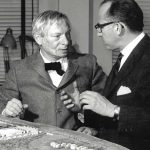Curb Your Immune Enthusiasm
Normally when we think of viruses, from the common cold to HIV, we want to boost people’s immunity to fight them. But for scientists who develop therapeutic viruses (to, for example, target cancer cells or correct gene deficiencies) a more important question is: How do we keep people’s natural immune responses at bay? In these cases, an overenthusiastic immune response actually undermines the therapy. Salk Associate Professor Axel Nimmerjahn and first author Yusuf Tufail—along with Associate Professor Clodagh O’Shea, Professor Greg Lemke and colleagues— discovered that inhibiting a protein called phospholipid scramblase 1 (PLSCR1) controls the infected cell’s antiviral response and provides long-term protection from immune attack and excessive inflammation. The results, described in the January 19, 2017, issue of Neuron, hold promise both for virally delivered treatments and inflammatory conditions like infections, autoimmune disorders such as lupus, or neurodegenerative diseases such as Alzheimer’s.
Featured Stories
 A Masterful DesignMaintaining the Salk Institute’s iconic architectural vision.
A Masterful DesignMaintaining the Salk Institute’s iconic architectural vision. Inside the Mind of Ted WaittWhether it’s vital funding, imaginative technology or the perspective of a successful CEO, new Board Chair Ted Waitt says adding a little magic in the right place enables great discoveries.
Inside the Mind of Ted WaittWhether it’s vital funding, imaginative technology or the perspective of a successful CEO, new Board Chair Ted Waitt says adding a little magic in the right place enables great discoveries. Surviving SuperbugsWe’re losing the war with infectious diseases. Ending the arms race with infectious diseases could mean learning to live with them.
Surviving SuperbugsWe’re losing the war with infectious diseases. Ending the arms race with infectious diseases could mean learning to live with them.





















































